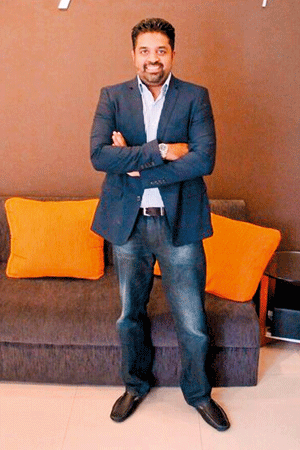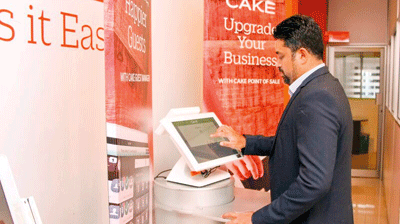A piece of cake for Fernando
View(s):
Founder Shanil Fernando
Shanil Fernando has the cake and eats it too. Huge mouthfuls of it with Cake Labs, a leading software company which is revolutionising the restaurant business, poised to grab a huge slice of the American market. Fernando takes pains to point out that Cake Labs – headquartered in Silicon Valley – is a start-up only in the US context and not in Sri Lanka, but with the American market being the major focus it made sense to feature this boy-wonder in these pages. So firstly how come the name Cake Labs? He says it is simply because it resonates well with the restaurant and food industry, just like cheese goes well with tomato in a sandwich. “Our vision is to make things simple for our merchants, just like a piece of cake,” explains Fernando, managing director at Cake Labs.
A precocious IT specialist, at 32 he was the youngest Vice President with Virtusa before leaving in 2009 to start Lattitude655 which later metamorphosised into Cake Corporation. Cake Corporation is a Silicon Valley-based company that creates disruptive technology for the restaurant industry. Cake Labs is its Sri Lanka-based (Flower Road in Colombo) engineering arm. It’s the engine room which processes over US$1 billion in revenue annually and is in use by over 5000 restaurants in the US. “We are a product company focusing on technology and building an end-to-end online platform for the restaurant business. Say you land in New York and you want to find a restaurant, make a booking, read reviews of that restaurant, and place your order as well as pay by credit. We offer all these products online,” Fernando outlines.
Sysco involvement
Cake Corporation is currently majority-owned by Sysco, the world’s largest food distributor, and a Fortune 100 Company with revenues of more than $50 billion a year. Last year Cake grew Year-On-Year at 150 per cent. And this is only the tip of the iceberg with Sysco having more than half-a-million clients in the restaurant business across the US. ”Sysco sources all your needs, and if you are running a restaurant, it is a one-stop shop that looks at your inventory and then delivers. They supply food to half-a-million restaurant and we want to tap into that supply chain and piggy-back on them. Even if we get 10 per cent of that business we will be a multi-billion dollar company.
The opportunity is massive,” reflects Fernando. Things might have been very different. Rewind to 1989. The JVP was causing chaos and mayhem throughout the country. Schools were closed. Fernando was studying at Royal which was also shut down. His parents decided that enough was enough and enrolled him at Colombo International School. Before joining his new school, Fernando went on holiday with friends to Nuwara Eliya. While playing ‘Hora, Police’ he got caught up in the action, tripped and fell 25 feet down a cliff face. He was badly injured and left with a ruptured spleen.

Checking out
Fall changes all
“Was that a life-changing event? I guess so if you consider that I lived to tell this tale. I was very seriously hurt and the fact that I lived was a defining moment,” Fernando smiles. The move to CIS also had a huge impact. For here he was able to dabble with computers. Royal didn’t have a computer lab while his new school did and to boot it came with a wonderful computer teacher. ”I wasn’t a nerd but I loved to play computer games. My first computer was a Sinclair ZX81 with 1K of memory. My parents bought it for my 12th birthday. At Royal I used to programme games, save it on tape and sell it to my friends. This was my first business,” recounts Fernando.
The move from Royal to CIS was a game-changer for Fernando in more ways than one. The original idea was that he would be sent to India to complete his O-Levels due to the disruption by the JVP. But CIS not only gave him more access to computers, the school also had good affiliations with British Universities. He went to the University of Warwick, and completed a degree in Computers and Management Science. Straight out of Warwick he was employed by Virtusa. It was 1996 and he was the 11th member of the original founding team working in the backyard of the home of the parents of founder Kris Canekeratne. Last month, Fernando was crowned ICT Leader of the Year (2016). He had completed two decades in the IT industry with this accolade.
When he left Virtusa in 2009, he was responsible for the delivery of two-thirds of Virtusa’s business generating over $100 million in revenue. Now there is a bigger challenge to accomplish. ”When we began we had around eight people. Today we have grown to 370 globally with around 270 of them in Sri Lanka. We began by being consultants. But my partners had a lot of experience in the payment space and we realised there was potential in this,” says Fernando. In 2009, small merchants were getting hooked onto technology. In the past, it was only big business which had access to technology like the banks, the telecommunication and insurance companies.
Small merchants
“We were building technology and products for big companies but later we realised that the small merchants were also getting this access. Go back five or six years and we did not have good Internet. But that is not the case today. Consumers like you and I have smartphones which are like what super computers were 10 years ago. We knew there would be a natural shift from large companies who could afford it, to Internet and technology becoming much cheaper for the small to medium-sized merchants.” ”When you look at the commerce done by small to medium-sized merchants they are way bigger that all the top companies.
In Sri Lanka, if you look at the small coffee shops, ‘saivar kades’ and small grocery shops, and add all the commerce they do, it is way bigger than the John Keells and the Aitken Spences’ and rest put together. We realised if we can build a product and a technology targeting these small merchants there was opportunity and huge potential.” ”When we started we focused on all small to medium-sized merchants but then found out that it was better to concentrate on one segment – the restaurant business,” Fernando explained.” It made good business sense especially with Sysco coming on board and acquiring an 80 per cent stake in Cake Corporation as it streamlined its online platform which seamlessly links customers, suppliers, staff and payment.
This is helped by smart mobile devices, now commonplace, connecting with POS terminals (Point of Sale) at restaurants. ”In the US there are around 5,000 restaurants using our products. In Sri Lanka we have around 60 in Colombo. We do about a billion dollars in processing in the US and are present in every state.” ”In our industry we are still considered a start-up. We are growing 150 per cent YOY but considering that in the US market alone there are a million restaurants, and through Sysco we have access to half-a-million of them, you can see the potential,” Fernando added. It’s really a case of having the Cake and eating it as well.- (Alvin)


